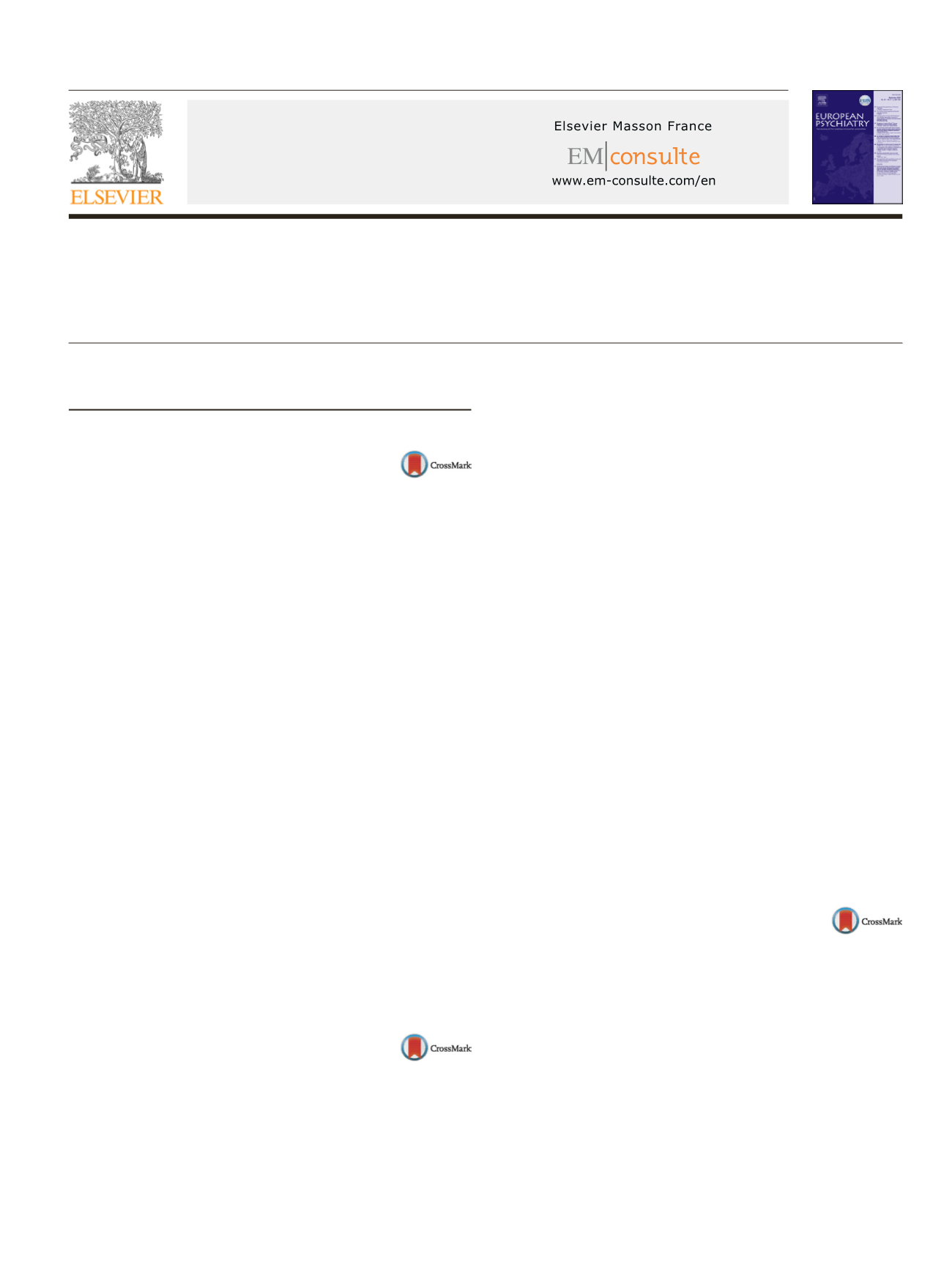
 European Psychiatry 41S (2017) S583–S644
European Psychiatry 41S (2017) S583–S644
Available online at
ScienceDirect
www.sciencedirect.com25th European Congress of Psychiatry
ePoster viewing part 4
e-Poster Viewing: Forensic psychiatry
EV0548
Psycho-social factors associated with
maternal neonaticide
T. Amirejibi
Ilia State University, Mental Health, Tbilisi, Georgia
Current research presents five case studies of maternal neonati-
cide in Georgia. Participants were under the age of thirty, with
incomplete secondary education, unemployed, dependent on their
families’ low income, living in the rural areas of Georgia. In three
cases, participants resided with their family of origin. They were
not married or in a relationship with the father of the child. They
described their families and communities as conservative, holding
strong cultural/religious beliefs against premarital sexual rela-
tions/childbirth out of wedlock. They lacked problem solving and
coping skills, avoided making decisions concerning the pregnancy
by concealing it. This being their first pregnancy, they gave birth
alone followed by panic and fear of detection, committed neonati-
cide and hid the body of the infant. None of them had a prior
criminal record. In the remaining cases, participants were married,
lived with their spouses and children, had financial hardships. Both
reported psychological and physical abuse from their spouses. One
of them had a prior criminal offense for possessing controlled sub-
stances. The motive for neonaticide was an unwanted child due to
an extramarital affair and threat of financial abandonment from
extended family. In both cases, infants suffered fatal injuries. All
participants reported lack of social support and emotional neglect
from family members. These results are in line with international
research, suggesting that certain patterns among thesemothers are
shared. Psychosocial factors associated with neonaticide should be
utilized in the process of planning and implementing preventive
strategies in health, social and legal frameworks.
Disclosure of interest
The author has not supplied his/her decla-
ration of competing interest.
http://dx.doi.org/10.1016/j.eurpsy.2017.01.878EV0549
Hardly manageable forensic case,
as a result of unsuitable legal and
psycho-social factors
V. Blakaj-Ramadani
1 ,∗
, B. Obertinca
1, F. Blakaj
21
University Clinical Center, Institute for Forensic Psychiary, Prishtina,
Kosovo
2
Medical Faculty, Forensic Medicine, Prishtina, Kosovo
∗
Corresponding author.
The court may impose a measure of mandatory psychiatric treat-
ment in custody in a health care institution on a perpetrator who
has committed offense while in a state of mental incompetence
or substantially diminished mental capacity. An offense should be
punishable by imprisonment of at least 3 years and is necessary
to avoid a serious danger. Implementation of this measure can be
difficult if surrounded by unsuitable psycho-social circumstances.
Patient N.N, Albanian, 22-years-old, was born in Kosovo and raised
in Germany. During this period, he only visited Kosovo 2–3 times.
A fewweeks before admission in the Institute (year 2014), he came
in Kosovo willingly, to escape a prison sentence in Germany. Due to
a fight, he was arrested and because of resistance that he showed,
in the court – psychiatrist proposes mandatory psychiatric treat-
ment. In admission was quiet, but after being told the rules of the
Institute, he started to become aggressive, refusing to speak and
eat. After refusal, his medical condition deteriorates. After “thera-
peutic weekend”, we saw improvement. The Court approved the
doctor’s proposal to change the measure. The measure must be
appropriate for the patient in order not to cause more harm than
good.
Disclosure of interest
The authors have not supplied their decla-
ration of competing interest.
Further reading
Kosovo, Penal Code.
Law on Mental Health.
Law on Kosovo Health.
Internal Regulation of Kosovo Forensic Psychiatry Institute.
http://dx.doi.org/10.1016/j.eurpsy.2017.01.879EV0550
Evaluation of elder physical abuse
G.E. Buicu
1 ,∗
, M. Gabos Grecu
1, A. Salcudean
1,
I. Gabos Grecu
1, C. Marinescu
2, A. Nirestean
1, S. Turliuc
3,
V. Hadareanu
4, I. Udristoiu
51
University of Medicine and Pharmacy, Psychiatry, Tirgu Mures,
Romania
2
County Hospital, Psychiatry, Pitesti, Romania
3
University of Medicine and Pharmacy, Psychiatry, Iasi, Romania
4
University of Medicine and Pharmacy, Forensic Medicine, Tirgu
Mures, Romania
5
University of Medicine and Pharmacy, Psychiatry, Craiova, Romania
∗
Corresponding author.
Background
In the society we belong to, elders are the target
of abuse which is many times generated by the social cultural
0924-9338/


















